Tata Consultancy Services Bundle
How did a division of Tata Sons become a global IT powerhouse?
In 2025, Tata Consultancy Services (TCS) celebrated surpassing $30 billion in annual revenue, a testament to its enduring success. But how did this Indian IT company evolve from its 1968 beginnings to become a global leader? This journey, spanning over five decades, showcases strategic foresight and relentless innovation in the tech industry.
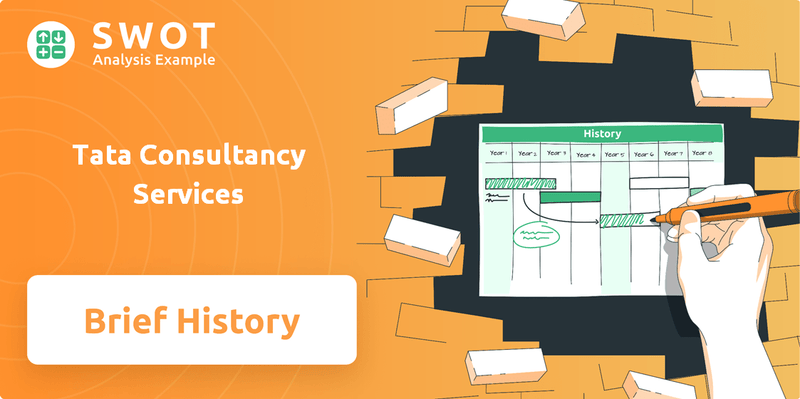
From its Tata Consultancy Services SWOT Analysis, to its current market position, TCS's story is one of remarkable growth. Understanding the TCS history, from its TCS origins within the Tata Group to its present-day status, provides valuable insights into the company's strategic evolution. This brief history of TCS India reveals the key milestones that have shaped this industry titan.
What is the Tata Consultancy Services Founding Story?
The story of Tata Consultancy Services (TCS) begins in 1968, marking the inception of an Indian IT company that would become a global leader. TCS history is deeply intertwined with the vision of the Tata Group, which established the company as a division of Tata Sons Limited. This strategic move was pivotal in recognizing and capitalizing on the emerging potential of information technology within India's growing industrial sector.
The founding of TCS was a response to the burgeoning need for data processing services, a service that was relatively new in the Indian market at the time. This initiative reflects the Tata Group's foresight in entering the IT field, positioning itself to meet the evolving demands of businesses across the country. The early years of TCS were characterized by a focus on providing essential services, setting the stage for its future expansion and impact on the IT industry.
The early business model of TCS centered on providing data processing services, including punch card operations, and later evolved to include software development and consultancy. This was a pioneering step in an era when IT services were still in their infancy globally. The name, Tata Consultancy Services, clearly communicated its purpose: to offer expert consulting services under the trusted Tata brand. Early financial backing came from within the Tata Group, leveraging the financial strength of one of India's largest multinational business conglomerates.
TCS was founded in 1968 as a division of Tata Sons Limited, marking its entry into the IT sector.
- The initial focus was on providing data processing services, responding to the needs of the burgeoning Indian industrial sector.
- The Tata Group's backing provided the necessary financial foundation for TCS's early operations and growth.
- TCS's early services included punch card operations, evolving to software development and consultancy.
- The company's name, Tata Consultancy Services, reflected its mission to offer expert consulting services.
The early years of TCS saw it laying the groundwork for its future success. The company's initial focus on data processing and software development services was a strategic move, positioning it to capitalize on the growing demand for IT solutions. The support from the Tata Group provided TCS with the resources needed to expand its operations and build a strong reputation in the market. The Marketing Strategy of Tata Consultancy Services has played a crucial role in its global presence.
Tata Consultancy Services SWOT Analysis
- Complete SWOT Breakdown
- Fully Customizable
- Editable in Excel & Word
- Professional Formatting
- Investor-Ready Format
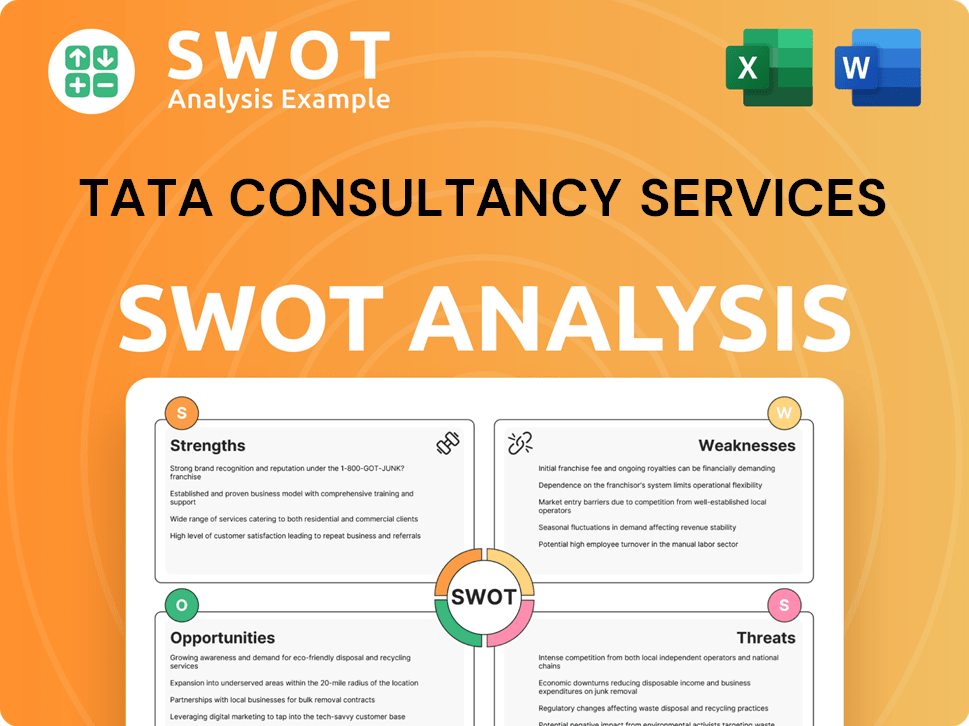
What Drove the Early Growth of Tata Consultancy Services?
The early growth of Tata Consultancy Services, or TCS, focused on software development and consulting, initially serving domestic clients. This Indian IT company expanded internationally, notably in the US and Europe, which was crucial for establishing its global reputation. The 'Location Independent Agile™' model played a key role in serving a global clientele efficiently.
During its early years, TCS evolved its service offerings from basic data processing to complex IT services. These included custom application development, system integration, and IT infrastructure services. Key acquisitions and partnerships facilitated expansion into new markets and product categories, shaping the TCS history.
In Q1 FY25, emerging markets, especially India, Latin America, and the MEA region, showed strong growth. India alone achieved a remarkable 61.8% growth, indicating a sustained focus on global expansion. This expansion was critical for the TCS company to leverage regional opportunities and increase its market presence.
TCS adapted to the evolving competitive landscape by investing in talent development and expanding its workforce. As of June 30, 2024, the workforce stood at 606,998, with a net addition of over 5,000 employees in Q1 FY25. This growth in human capital enabled the company to handle larger projects.
Strategic moves, including acquisitions and partnerships, were instrumental in TCS's expansion. These initiatives allowed TCS to enter new geographical markets and broaden its service offerings. Such moves have been a significant part of the TCS history and its growth trajectory within the Tata Group.
Tata Consultancy Services PESTLE Analysis
- Covers All 6 PESTLE Categories
- No Research Needed – Save Hours of Work
- Built by Experts, Trusted by Consultants
- Instant Download, Ready to Use
- 100% Editable, Fully Customizable
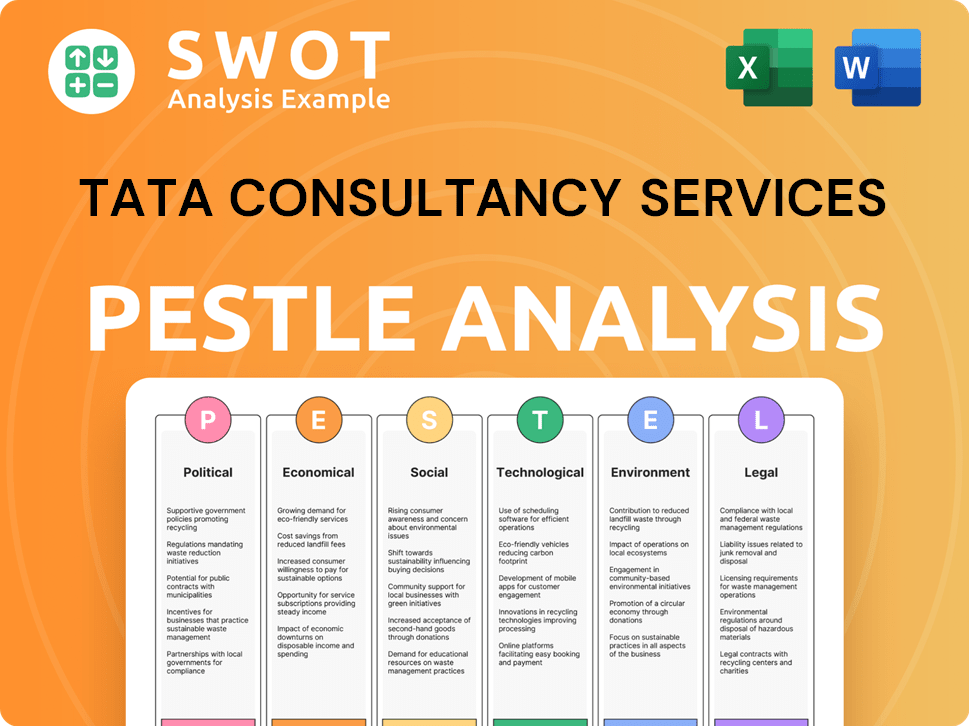
What are the key Milestones in Tata Consultancy Services history?
The journey of Tata Consultancy Services, an Indian IT company, has been marked by significant milestones, innovations, and challenges since its inception. From its TCS origins to its current position as a global leader, the company has consistently adapted and evolved. Understanding the key milestones in TCS history provides valuable insights into its growth trajectory and impact on the IT industry.
| Year | Milestone |
|---|---|
| 1968 | Tata Consultancy Services was founded as a division of Tata Sons. |
| 1970s | TCS began providing services to clients in the US, marking its early international expansion. |
| 1980s | TCS played a key role in the Indian IT revolution, focusing on software development and consulting. |
| 1990s | TCS expanded its global presence significantly, establishing offices worldwide and broadening its service offerings. |
| 2004 | TCS became a publicly listed company, further solidifying its market position. |
| 2024-2025 | TCS continues to focus on AI and cloud adoption, with significant investments in talent development and innovation. |
TCS has consistently been at the forefront of technological innovation, particularly in adopting and scaling new technologies. In Q1 FY25, TCS saw strong growth in AI-infused cloud adoption journeys, deploying over 270 AI/GenAI engagements.
TCS is heavily investing in AI and GenAI, with the AI deal pipeline growing to $1.5 billion. This focus is crucial for modernizing technology stacks and driving revenue opportunities.
TCS emphasizes cloud adoption, which is a key strategy for modernizing client technology stacks. This approach has provided significant revenue opportunities.
TCS has a global network of Pace Port co-innovation hubs to foster innovation. These hubs are essential for driving new solutions and services.
The company focuses on talent development, with 56 million learning hours clocked and 5.2 million competencies acquired in FY25. This upskilling is particularly important in AI/ML and Gen AI.
TCS helps clients modernize their legacy systems, which drives revenue. This is a key part of the company's strategy.
TCS consistently invests in research and innovation, including intellectual property. This helps the company stay ahead of the curve.
TCS has faced challenges such as market downturns and competitive threats, especially in North America. In Q4 FY25, the company's net profit saw a 1.7% year-on-year decline to ₹12,224 crore, and revenue growth was 5.3% to ₹64,479 crore, primarily due to weakness in North America.
TCS has experienced market downturns, which have impacted its performance. Client caution and tight budgets have affected revenue.
The company faces competition in key markets like North America. This has led to slower growth in certain areas.
Weakness in North America has been a significant challenge. Despite this, TCS has achieved a record total contract value (TCV) of $12.2 billion in Q4 FY25.
TCS demonstrates resilience by securing large deals, even without mega-deals. The record Q4 FY25 TCV showcases its ability to navigate uncertain environments.
TCS's investment in upskilling its workforce is crucial for overcoming future challenges. This focus on talent development helps drive growth and innovation.
Global economic conditions impact TCS's performance. The company adapts to these conditions through strategic pivots and investments.
Tata Consultancy Services Business Model Canvas
- Complete 9-Block Business Model Canvas
- Effortlessly Communicate Your Business Strategy
- Investor-Ready BMC Format
- 100% Editable and Customizable
- Clear and Structured Layout
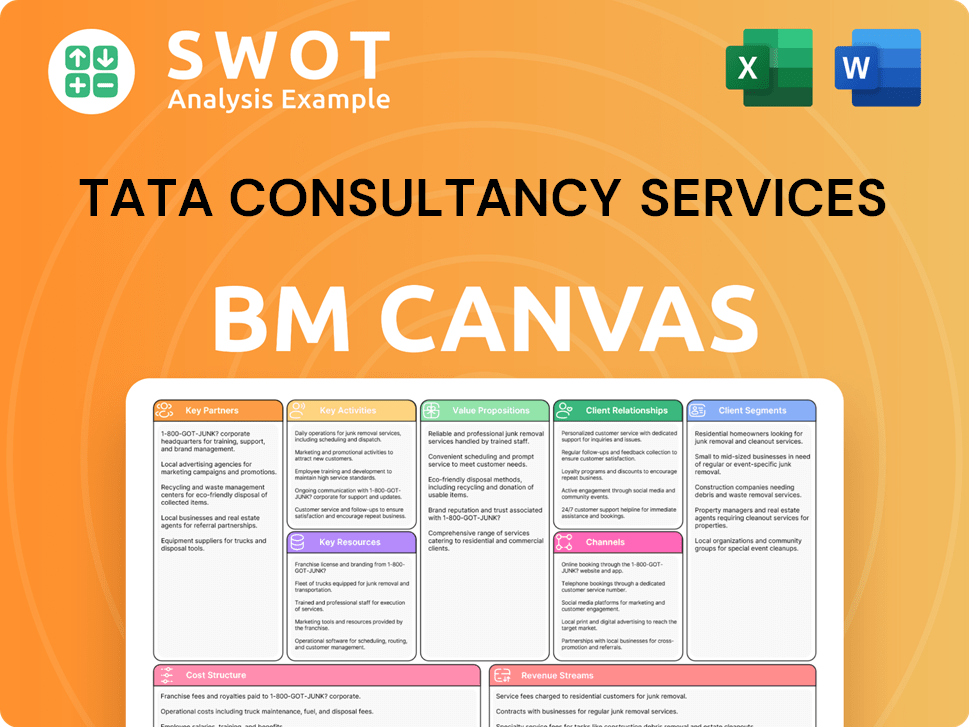
What is the Timeline of Key Events for Tata Consultancy Services?
The TCS history is a testament to its adaptability and growth within the global IT landscape. Founded in 1968 as a division of Tata Sons, the company quickly expanded internationally, establishing a presence in the US and Europe during the early 1970s. The late 1990s saw a strategic focus on the Y2K and dot-com boom, solidifying its global presence. In 2004, TCS became a publicly listed company, accelerating its growth trajectory. The introduction of the Location Independent Agile™ delivery model in 2008 further enhanced its service offerings. The 2010s were marked by significant expansion into digital transformation, cloud services, and cybersecurity, solidifying its position as a leader in the industry.
| Year | Key Event |
|---|---|
| 1968 | Founded as a division of Tata Sons, marking the TCS origins. |
| Early 1970s | Began international operations, expanding into the US and Europe. |
| Late 1990s | Focused on Y2K and dot-com boom opportunities, solidifying its global presence. |
| 2004 | Became a publicly listed company, accelerating its growth. |
| 2008 | Introduced the Location Independent Agile™ delivery model. |
| 2010s | Expanded significantly into digital transformation, cloud services, and cybersecurity. |
| FY2024 | Generated consolidated revenues of US$29.1 billion. |
| Q4 FY25 | Reported a consolidated net profit of ₹12,224 crore and revenue of ₹64,479 crore, with a record Q4 TCV of $12.2 billion. |
| FY25 | Annual revenue reached ₹255,324 crore (US$30.18 billion), marking a 6% year-on-year increase (4.2% in constant currency). |
| Q1 FY25 | Revenue reached US$7.51 billion, a 3.9% YoY increase (4.4% in constant currency), with emerging markets, especially India, showing double-digit growth. |
| May 2025 | Recognized as one of the world's top 50 brands by Kantar BrandZ; brand value soared 28% YoY to $57.3 billion. |
| June 2025 | Partnered with Virgin Atlantic to modernize airline operations with AI-led solutions. |
TCS is strategically investing in AI infrastructure and cloud adoption. This is part of its plan to stay at the forefront of technological advancements. These investments are designed to enhance its service offerings and meet evolving client needs.
The company is committed to developing its talent pool. This includes training employees in new technologies and methodologies. This will ensure that TCS has the skilled workforce needed for future growth.
TCS anticipates FY25 to perform better than FY24, with FY26 expected to be even stronger. Analysts predict a revenue growth of 5.4% per annum over the next three years. Profit margins are projected to increase from 19.0% to 19.9%.
TCS aims to increase its market share through investments in AI, legacy modernization, and product portfolio expansion. The company's strong order book, with a total contract value of $39.4 billion for FY25, indicates its ability to transform industries.
Tata Consultancy Services Porter's Five Forces Analysis
- Covers All 5 Competitive Forces in Detail
- Structured for Consultants, Students, and Founders
- 100% Editable in Microsoft Word & Excel
- Instant Digital Download – Use Immediately
- Compatible with Mac & PC – Fully Unlocked
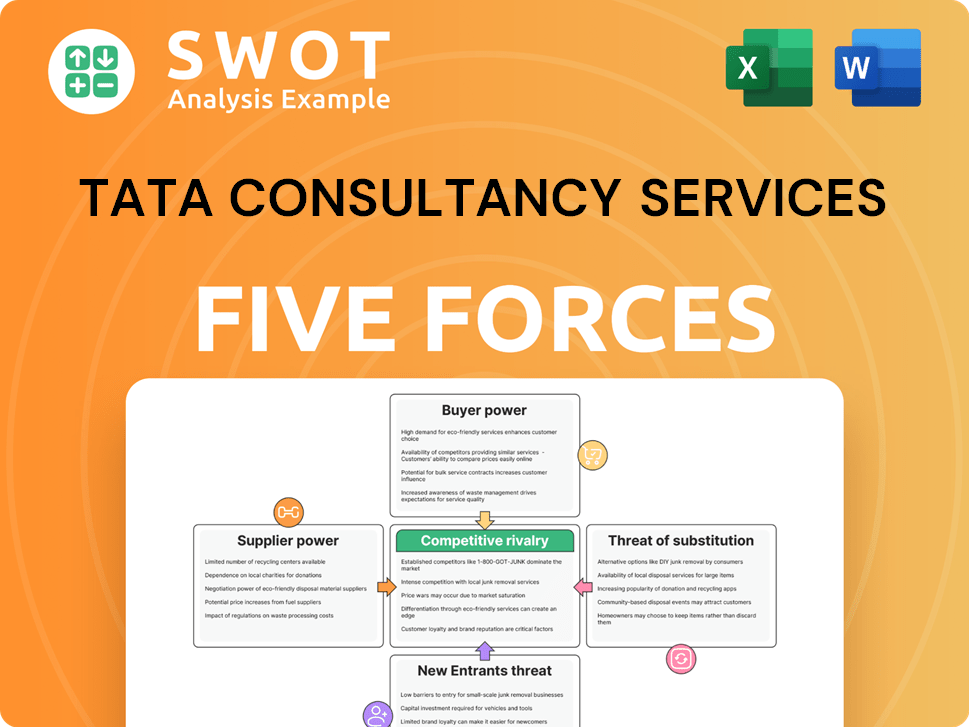
Related Blogs
- What is Competitive Landscape of Tata Consultancy Services Company?
- What is Growth Strategy and Future Prospects of Tata Consultancy Services Company?
- How Does Tata Consultancy Services Company Work?
- What is Sales and Marketing Strategy of Tata Consultancy Services Company?
- What is Brief History of Tata Consultancy Services Company?
- Who Owns Tata Consultancy Services Company?
- What is Customer Demographics and Target Market of Tata Consultancy Services Company?
Disclaimer
All information, articles, and product details provided on this website are for general informational and educational purposes only. We do not claim any ownership over, nor do we intend to infringe upon, any trademarks, copyrights, logos, brand names, or other intellectual property mentioned or depicted on this site. Such intellectual property remains the property of its respective owners, and any references here are made solely for identification or informational purposes, without implying any affiliation, endorsement, or partnership.
We make no representations or warranties, express or implied, regarding the accuracy, completeness, or suitability of any content or products presented. Nothing on this website should be construed as legal, tax, investment, financial, medical, or other professional advice. In addition, no part of this site—including articles or product references—constitutes a solicitation, recommendation, endorsement, advertisement, or offer to buy or sell any securities, franchises, or other financial instruments, particularly in jurisdictions where such activity would be unlawful.
All content is of a general nature and may not address the specific circumstances of any individual or entity. It is not a substitute for professional advice or services. Any actions you take based on the information provided here are strictly at your own risk. You accept full responsibility for any decisions or outcomes arising from your use of this website and agree to release us from any liability in connection with your use of, or reliance upon, the content or products found herein.